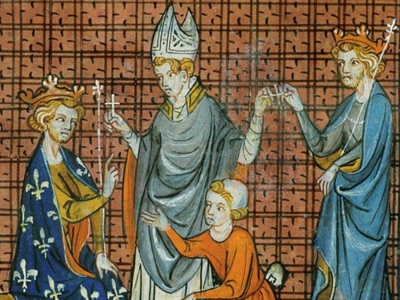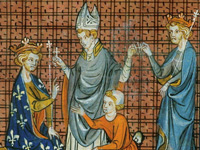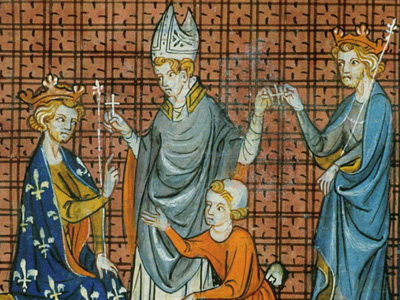Third Crusade (1189–1192)

Background
Muslim Unification
After the failure of the Second Crusade, Nur ad-Din Zangi had control of Damascus and a unified Syria. Eager to expand his power, Nur ad-Din set his sights on the Fatimid dynasty of Egypt. In 1163, Nur ad-Din sent his most trusted general, Shirkuh, on a military expedition to the Nile. Accompanying the general was his young nephew, Saladin. With Shirkuh's troops camped outside of Cairo, Egypt's sultan Shawar called on King Amalric I of Jerusalem for assistance. In response, Amalric sent an army into Egypt and attacked Shirkuh's troops at Bilbeis in 1164.
In an attempt to divert Crusader attention from Egypt, Nur ad-Din attacked Antioch, resulting in a massacre of Christian soldiers and the capture of several Crusader leaders, including Bohemond III, Prince of Antioch. Nur ad-Din sent the scalps of the Christian defenders to Egypt for Shirkuh to proudly display at Bilbeis for Amalric's soldiers to see. This action prompted both Amalric and Shirkuh to lead their armies out of Egypt.
In 1167, Nur ad-Din again sent Shirkuh to conquer the Fatimids in Egypt. Shawar again opted to call upon Amalric to defend his territory. The combined Egyptian-Christian forces pursued Shirkuh until he retreated to Alexandria. Amalric then breached his alliance with Shawar by turning his forces on Egypt and besieging the city of Bilbeis. Shawar pleaded with his former enemy, Nur ad-Din, to save him from Amalric's treachery. Lacking the resources to maintain a prolonged siege of Cairo against the combined forces of Nur ad-Din and Shawar, Amalric retreated. This new alliance gave Nur ad-Din rule over virtually all of Syria and Egypt.

These books are available for download with Apple Books on your Mac or iOS device
Saladin's Conquests
Shawar was executed for his alliances with the Christian forces, and Shirkuh succeeded him as vizier of Egypt. In 1169, Shirkuh died unexpectedly after only weeks of rule. Shirkuh's successor was his nephew, Salah ad-Din Yusuf, commonly known as Saladin. Nur ad-Din died in 1174, leaving the new empire to his 11-year-old son, As-Salih. It was decided that the only man competent enough to uphold the jihad against the Franks was Saladin, who became sultan of Egypt and Syria and the founder of the Ayyubid dynasty.
Amalric also died in 1174, leaving Jerusalem to his 13-year-old son, Baldwin IV. Although Baldwin suffered from leprosy, he was an effective and active military commander, defeating Saladin at the battle of Montgisard in 1177, with support from Raynald of Châtillon, who had been released from prison in 1176. Raynald later forged an agreement with Saladin to allow free trade between Muslim and Christian territories. He also raided caravans throughout the region and expanded his piracy to the Red Sea by sending galleys to raid ships, and to assault the city of Mecca itself. These acts enraged the Muslim world, giving Raynald a reputation as the most hated man in the Middle East.
Baldwin IV died in 1185, and the kingdom was left to his nephew Baldwin V, whom he had crowned as co-king in 1183. Raymond III of Tripoli again served as regent. The following year, Baldwin V died before his ninth birthday, and his mother Princess Sybilla, sister of Baldwin IV, crowned herself queen and her husband, Guy of Lusignan, king. Raynald again raided a rich caravan and had its travelers thrown in prison. Saladin demanded that the prisoners and their cargo be released. The newly crowned King Guy appealed to Raynald to give in to Saladin's demands, but Raynald refused to follow the king's orders.
Siege of the Kingdom of Jerusalem
This final act of outrage by Raynald gave Saladin the opportunity he needed to take the offensive against the kingdom, and in 1187 he laid siege to the city of Tiberias. Raymond advised patience, but King Guy, acting on advice from Raynald, marched his army to the Horns of Hattin outside of Tiberias. The Frankish army, thirsty and demoralized, was destroyed in the ensuing battle, and the city would not be held again by Christians until 1229.
King Guy and Raynald were brought to Saladin's tent, where Guy was offered a goblet of water because of his great thirst. Guy took a drink and then passed the goblet to Raynald. Raynald's having received the goblet from King Guy rather than Saladin meant that Saladin would not be forced to offer protection to the treacherous Raynald (it was custom that if you were personally offered a drink by the host, your life was safe). When Raynald accepted the drink from King Guy's hands, Saladin told his interpreter, "say to the King: 'it is you who have given him to drink'". Afterwards, Saladin beheaded Raynald for past betrayals. Saladin honored tradition with King Guy, who was sent to Damascus and eventually ransomed to his people, one of the few captive Crusaders to avoid execution.
By the end of the year, Saladin had taken Acre and Jerusalem. Pope Urban III is said to have collapsed and died upon hearing the news of the battle of Hattin.
HISTORY

RESOURCES
This article uses material from the Wikipedia article "Third Crusade (1189–1192)", which is released under the Creative Commons Attribution-Share-Alike License 3.0.
© Stories Preschool. All Rights Reserved.






